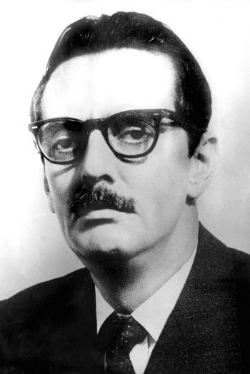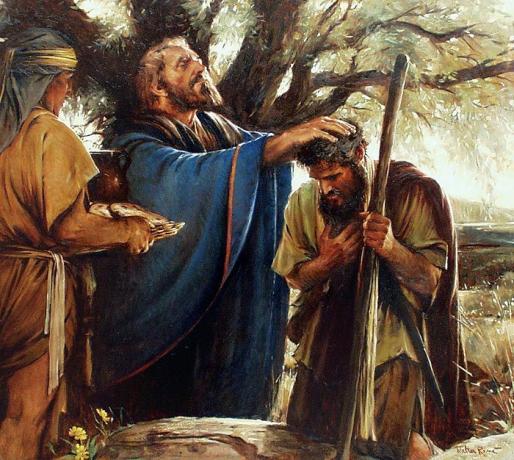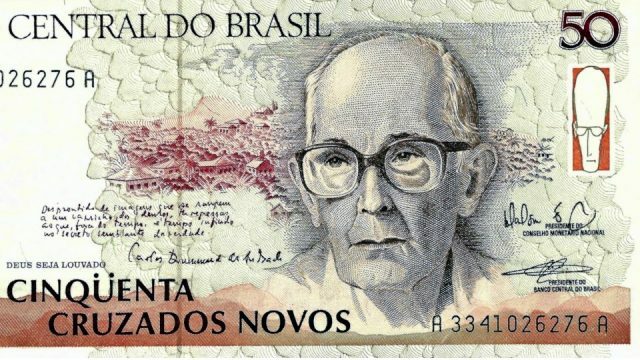Janio Quadros he was a politician and the 22nd president of Brazil from January 31, 1961 to August 25, 1961. He succeeded Juscelino Kubitschek (1902-1976). In addition, he was a teacher and a lawyer.
Jânio Quadros' Biography
Jânio da Silva Quadros was born in Campo Grande, capital of Mato Grosso do Sul, on January 25, 1917.
He attended primary education in Curitiba, capital of Paraná, at the “Grupo Escolar Conselheiro Ezequiel da Silva Romero Bastos” and at the “Colégio Estadual do Paraná” until 1930. Shortly thereafter, he moves to São Paulo and attends the “Colégio Marista Arquidiocesano de São Paulo”.
In 1943, he graduated in Law from the University of São Paulo. He then taught geography and Portuguese at Colégio Dante Alighieri, Colégio Vera Cruz and Universidade Presbiteriana Mackenzie.
He began his political career by being elected councilor, and later, mayor, governor and federal deputy for the state of São Paulo.
These positions were essential to acquire popularity among São Paulo and, later, assume the position of President of the Republic.
He married Eloá Quadros in 1942 and had a daughter Dirce Maria Quadros who followed a political career. She was a federal deputy for the PSDB from 1987 to 1991.
He died in São Paulo, on February 16, 1992, aged 75 years.
The Government of Jânio Quadros
Jânio Quadros rose to the presidency of the Brazilian government in 1961, elected with 5.6 million votes and supported by the UDN (National Democratic Union). This party was center-right and allied with US policies. His political opponent was Marshal Henrique Teixeira Lott (1894-1984).
with your vice president João Goulart (1918-1976), from the PTB, formed the plate called "Jan-Jan”.
The scenario in Brazil was one of crisis, as the government of Juscelino Kubitschek (1956-1960) left the country with an unstructured economy, inflation and higher external debt.
To contain these problems, Quadros froze wages, devalued the national currency and restricted access to credit funds, in an attempt to balance the economy.
As for the external scenario, the world lived the Cold War (led by the two world superpowers, USA, capitalist, and USSR, socialist). In this way, Jânio remained in a neutral position and, often, being pragmatic and favoring economic interests.
Despite being considered conservative and anti-communist, this position was not reflected in Jânio Quadros' foreign policy. He approached socialist nations like Cuba, China and the USSR.
In 1961, he participated in the delivery of the “Grã-Cruz do Cruzeiro do Sul”, the highest award from the Brazilian government to Che Guevara (1928-1967), leader of the socialist movement in Latin America. This gesture provoked criticism from the Brazilian right.
He was a charismatic leader of the masses, trying to reach out to the people by wearing dark suits, onto which he dropped dandruff in order to appear more popular.
Although he had a certain authoritarian inclination, Jânio helped to consolidate the democratic regime in the country, repeatedly attacking the elite, in defense of the popular classes.
Following this line, his actions were somewhat controversial, such as:
- ban on wearing bikinis on beaches
- suspension of cockfights
- ban on the use of perfume launchers
This demonstrated weakness in the goals of the proposed political plan, thus alienating the population and over time, the president lost his popularity.
The resignation of Jânio Quadros
Indeed, after losing support from the military and with the pressure of Carlos Lacerda (1914-1977), leader of the UDN, Jânio resigned on August 25, 1961.

His presidential term was one of the shortest (almost seven months) in the history of the country's presidency. The position was later assumed by the vice president: João Goulart.
In a letter to the National Congress, Jânio Quadros declared the pressure he was suffering from “terrible forces”, a determining factor in justifying his resignation.
Below are some excerpts from the Letter:
I was defeated by the reaction and so I leave the government. In these seven months I have fulfilled my duty. I have done it day and night, working tirelessly, without prevention or grudges.
But my efforts to lead this nation, which on the path of its true political liberation and economic, the only one that would enable effective progress and social justice, to which its generous people are entitled.
I wished for a Brazil for Brazilians, facing, in this dream, corruption, lies and cowardice that they subordinate general interests to the appetites and ambitions of groups or individuals, including the outside.
But I feel crushed. Terrible forces rise up against me and intrigue or infamous me, even under the guise of collaboration.
Thus, I close with my thoughts turned to our people, to students, to workers, to the great family of Brazil, this page of my life and national life. I don't lack the courage to resign. I now return to my work as a lawyer and teacher. We will all work. There are many ways to serve our homeland.
Phrases by Janio Quadros
- “I drink it because it's liquid, if it were solid I'd eat it.”
- “The PMDB is Noah's ark, without Noah and without the ark.”
- “Intimacy breeds annoyances or children. Since I don't want any hassles with you, let alone children, call me Lord.”
- “I learned in my cradle from my mother that there is no man half honest and half dishonest. They are either entirely honest or they are not..”
- “Inflation dissolves money, debases treasures, compromises credit, disrupts production, paralyzes works, disgraces governments, depletes individuals, ferments revolutions.”
- “In this country, millions and millions of men work, work for a few to eat, eat.
Curiosity
- The broom was the symbol of Jânio Quadros' presidential campaign, as he intended to “sweep” the country's corruption. The jingle "sweeps sweeps broom/sweeps buns” became a hit at the time.
- With the return of democracy, in 1985 Jânio Quadros would be elected mayor of São Paulo, defeating the then senator Fernando Henrique Cardoso.
Read more about the Goals plan.


